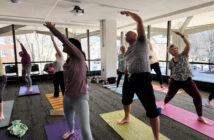The very first Japandroids song I ever heard was on a mix CD my best friend Susan gave to me for my birthday in high school. Something inside my head lit up from the minute the drums came in, and from the first distorted and grungy guitar chord, I knew I had stumbled on something incredible.
Music has always been with me. All of my best memories are centered around music — listening to the radio in the evening with my dad as a tiny kid while doing puzzles on the floor before bed; my very first piano lessons, which I would continue for almost 15 years; meeting my best friends in high school through marching band. Music had always been able to give me a voice. Emotions that I’m horrible at expressing verbally were communicated through my fingers with Debussy and Chopin, or through my weekly song obsessions.
Don’t get me wrong — I was well versed in rock by the time I got to high school. But punk rock had a different fire to it. It was angry but full of youthful drive and hope. If music had been my voice before, punk rock became my megaphone. At the risk of sounding sentimental, punk taught me how to survive.
Punk taught me my first lesson at 15. I got caught, rather suddenly, in my first mosh pit at a Japandroids concert in Philadelphia. I was terrified for a good minute. I was surrounded by dudes twice my size and strength, and there was nowhere to go.
At that moment, the adrenaline kicked in. The energy of the crowd and my two heroes shredding away on stage rushed through me. I fell into the frenetic rhythm of the pit. I quickly figured out that fighting it made it worse and that all I had to do was react and protect myself. Life is certainly a mosh pit. There will be calm spots where you can dance a little — and finally, maybe see your feet — but then a 200 pound guy gets pushed into you and there’s nothing much you can do but try to stay upright.
Life will push things at you unexpectedly. Things that you can’t control. Sometimes it will be a new friend or a promotion, but sometimes it will knock the wind out of you and there won’t be anything you can do to stop it. You can’t fight it, just like you can’t fight the mosh pit. Sometimes, you get knocked so hard that you end up flat on the ground. Mosh pit etiquette states that everyone pauses momentarily to help this person back up and make sure they aren’t hurt.
I learned that when I can’t control what’s happening to me, I need to go with the flow in order to survive. And if I’m ever in trouble, I know there are people I can count on to help me back up.
Punk taught me my second lesson when I discovered Bikini Kill in college. The brainchild of Kathleen Hanna, this all-girl Pacific Northwest band fought for women’s rights in a scene that had been traditionally male-dominated. None of the band’s members had any musical backgrounds, but they had stories that needed to be heard — shouted, even. Bikini Kill would greatly influence the third wave of feminism and subsequent bands like Nirvana. They were messy, they were unapologetic and they were in your face.
As a born and bred perfectionist, the concept of something being even slightly out of order is an awful notion. It takes me hours to start assignments sometimes because I know I won’t be able to make them as perfect as I’d like. It’s insanely frustrating. However, finding Bikini Kill finally got me to loosen up a little more. They didn’t care about being accurate. They didn’t care about being the best punk band ever. They cared about making a political statement, yelling about the issues they cared about until they were hoarse. It was in this devil-may-care attitude that I found some release.
It’s okay to be messy and it’s certainly okay to make mistakes. Bikini Kill’s members started with what they had and turned the band into a defining cultural moment. It started me thinking about all the things I could do and could accomplish if I let go of the fear of messing up.
Punk rock had also taught me to stick up for myself and to rebel against things that I don’t like or that are unjust. When most people think of punk rock, images of mohawk-haired teens emblazoned with anarchy symbols are brought to mind. Its very foundations are built on rejecting the normative and questioning authority.
While I don’t necessarily identify with anarchy, I learned to question who or what authenticated authority. I learned that it’s good to be loud about what you want to change. You have a right to dissent and a right to speak up when you don’t like what’s going on. It’s possible to change things through your words and ideas.
Without punk music, I would not be the person I am today. I’m vastly more outgoing than I was in high school. I take more risks and I’m more willing to put myself out there. I try to do at least one thing that scares me every day. I have stories to be told, too. Stories to be shouted. Punk has given me a foundation to proclaim these stories, and the fire and drive to continue to survive.






Comment policy
Comments posted to The Brown and White website are reviewed by a moderator before being approved. Incendiary speech or harassing language, including comments targeted at individuals, may be deemed unacceptable and not published. Spam and other soliciting will also be declined.
The Brown and White also reserves the right to not publish entirely anonymous comments.